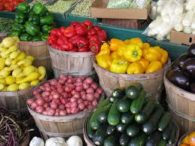Why Choose Organic Food?
In the last decade, organic-mania has gone wild. Everyone these days wants to eat organic food, or buy organic clothes, organic baby supplies, organic furniture and so on. There is a general belief globally that the environment is contaminated with chemicals and many medical disorders may be as a result of pollution and chemicals. Almost every type of commercialized food in the past has had some type of artificial chemical inserted to make it look nicer and taste better. Further, the incidence of mental problems in children has increased and thought to be due to the increased consumptions of foods containing artificial chemicals. Well, things have changed recently and consumers have become more knowledgeable and have started to read labels before buying foods.
So what exactly is organic?
Organic farming is production of plant and animal foods without use of insecticides, pesticides, or herbicides. Organic farming is production of plants based on use of chemical-free fertile soil and a variety of crops are cycled to keep the land healthy. Once plants have grown, they are processed and packaged without the use of any artificial chemicals. Typically, organic foods contain fewer chemicals than non-organic products.
Similarly, animals raised on organic farms are treated properly and fed with organic- food. sources.
The biggest benefit of consuming organic foods is that they contain fewer synthetic chemicals. The taste of such foods is fresh, original, and pure. The other benefit of organic foods is that the environment remains free of pollution from chemicals. People and animals that live in these areas have cleaner water to drink and fresh air to breathe.
Eating organic foods prevents one from getting exposure to toxic pesticides and insecticides. Animals reared in organic farms are not administered hormones or antibiotics and thus humans who consume meat from these animals have zero chance of being exposed to such chemicals. There are reports that excessive consumption of non-organic foods may result in health and growth problems in children.
Going organic is not only of personal benefit but also good for the environment. Organic farms generate better air for the environment and limit pollution of local waters and rivers. Commercial farming is profit oriented and is limited to production of few foods grown with use of insecticides and pesticides. Further, commercial farming released tons of chemicals that are harmful to birds, fish, and local animals living on land.
By growing organic foods, there is a promotion of a healthier ecosystem that allows both humans and animal to thrive. Further, absence of chemicals allows insects and bees to help pollinate land and helps microorganisms thrive and fertilize soil.
Organic foods are widely available in most cities and towns globally. Each organic food has a label that has a certified “organic” stamp on it. Random inspections of organic farms are made to ensure that all foods and animals are organically maintained and use of chemicals is at a bare minimum. Because organic farming encourages good health, animals are also treated properly and reared in clean living conditions. The eventual aim of organic foods is to ensure that our food supply remains free of chemicals and the environment remains clean.
Even though organic foods taste better and are fresh, there is one minor negative. Organic products generally tend to be slightly more expensive than commercialized foods. – this is a small price to pay for future generations to live in a chemical free world.
By Janet Schlarbaum. At Jai Yes Foods, we believe we’re helping consumers reconsider their outlook towards eating organically and locally. Janet Schlarbaum, a nutritional expert for over 22 years. Jai Yes, Ltd. has contracted farms across the east coast to grow certified organic produce which is then distributed through large supermarket chains across the nation.
